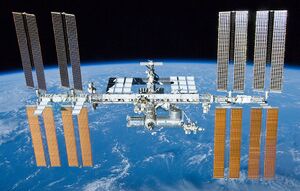Engineering (nonfiction): Difference between revisions
Jump to navigation
Jump to search
(Created page with "'''Engineering''' is the application of mathematics, empirical evidence and scientific, economic, social, and practical knowledge in order to inve...") |
No edit summary |
||
| Line 1: | Line 1: | ||
'''Engineering''' is the application of [[Mathematics (nonfiction)|mathematics]], empirical evidence and scientific, economic, social, and practical knowledge in order to invent, design, build, maintain, research, and improve structures, [[machines]], tools, systems, components, materials, and processes. | [[File:International_Space_Station_after_undocking_of_STS-132.jpg|thumb|The International Space Station represents a modern engineering challenge from many disciplines.]]'''Engineering''' is the application of [[Mathematics (nonfiction)|mathematics]], empirical evidence and scientific, economic, social, and practical knowledge in order to invent, design, build, maintain, research, and improve structures, [[machines]], tools, systems, components, materials, and processes. | ||
== Description == | == Description == | ||
Revision as of 14:14, 4 June 2016
Engineering is the application of mathematics, empirical evidence and scientific, economic, social, and practical knowledge in order to invent, design, build, maintain, research, and improve structures, machines, tools, systems, components, materials, and processes.
Description
The discipline of engineering is extremely broad, and encompasses a range of more specialized fields of engineering, each with a more specific emphasis on particular areas of applied science, technology and types of application.
Etymology
The term "engineering" is derived from the Latin ingenium, meaning "cleverness" and ingeniare, meaning "to contrive, devise".
